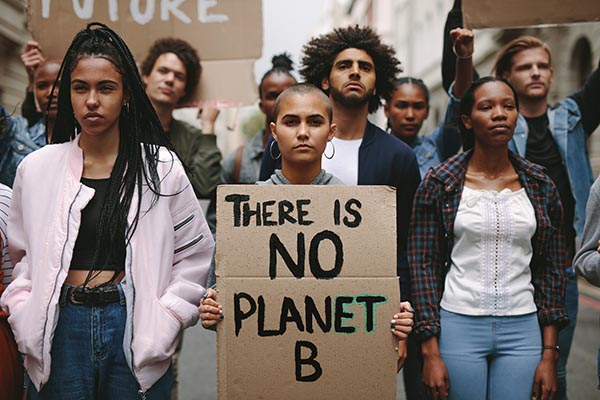Individual responsibility and accountability is an important element of reaching global sustainability goals. What’s up with U.S. consumers’ apparent lack of concern?
A recent Women’s Wear Daily (WWD) article caught my attention, headlined “U.S. Consumers Lag in Global Sustainability Sentiment, According to ESW Report.” This is based on the latest Global Voices survey from ESW, a direct-to-consumer ecommerce firm. The latest survey was compiled from more than 18,600 completed surveys. The report notes that not only are U.S. consumers less “green-minded” than their counterparts in other countries, but they are also less sustainability minded than they were a year ago.
This data came hot on the heels of our article last month, wherein we basically questioned the commitment of companies, governments, non-profits, and even individuals, in making the sacrifices required to achieve sustainability goals. We noted that consumers may feel somewhat helpless to address these big challenges, but also pointed out, “in the area of buying habits, consumers can drive change quickly by bargaining with their wallets.”
In some parts of the world, consumers are more green-minded than others, according to the ESW report. The report delivered a sustainability sentiment score for consumers in a variety of countries around the globe. The mean global score was 55, out of a possible 100. These countries ranked highest:
- India, at 75;
- United Arab Emirates at 74;
- China at 70 (!!); and
- Mexico at 67.
Where was the U.S in the mix? A paltry 49 this year, versus 51 last year—which wasn’t that great of a score either. But it was truly disappointing to see even this smallish decline coming from one of the world’s largest commercial markets. Other countries that delivered low scores included:
- Canada and Switzerland at 48;
- The UK and Germany at 46; and
- Japan at 32.
According to the WWD article, “The sustainability sentiment score reflects the percentage of those polled who said they agree or strongly agree with 14 of the sustainability sentiments. These include declarative statements such as them trying to be more sustainable in their day-to-day life or they no longer buy brands that have poor environmental records.”
There were generational differences, of course. In the U.S., Millennials scored highest at 59 (down from 62 last year), with Gen Z (57), Gen X (50), and Baby Boomers (35) scoring lower.

Let’s face it, my fellow Baby Boomers and I won’t likely be around in 2050, which has been held out as the Net Zero goal. But still, our children and grandchildren and beyond likely will be. That should be a driver for being more concerned about sustainability than the 35 score would indicate. Perhaps it demonstrates that old habits die hard. But still, no excuse.
And How Are Privately-Held Companies Doing?
Not so good. As we pointed out in our article last month, it’s not just individuals. For companies, most of the focus has been placed on publicly traded companies, who are required to report on ESG commitments and progress. But what about privately-owned companies? In the U.S., there are some 800,000 of those, not an insignificant number. And Privco, a source for financial and market intelligence on privately held companies that are earning at least $1 million in annual revenue or have at least $1 million in venture capital backing, states that hundreds of new profiles, funding rounds and deals are being added weekly. And those companies are operated mostly by—you guessed it—individuals. The Zero Carbon Academy, “While many publicly listed firms have set net zero targets, privately held firms are lagging behind with only a fraction of these companies having done the same, despite incoming climate legislation.”
John Lang, Project Lead, Net Zero Tracker (The Energy and Climate Intelligence Unit), said, “If ‘sunlight is the best disinfectant’ for climate inaction, most private firms are operating nocturnally—beyond the glare of the civil scrutiny, investor pressure, and disclosure requirements faced by listed companies.…New measures being introduced in regions from the EU, to the US and Singapore—some with extra-territorial dimensions, are changing the rules of the game. What goes on in the EU does not stay in the EU. And what goes on in a regulated public company will not stay in a public company: one company’s indirect emissions are another's direct emissions.” In other words, this poor performance on the part of privately held companies also affects the rest of the corporate environment, since many of them are suppliers to publicly held companies, creating a drag on their overall performance across the entire supply chain (Scope 3). The EPA defines Scope 3 as follows:
Scope 3 emissions are the result of activities from assets not owned or controlled by the reporting organization, but that the organization indirectly affects in its value chain. An organization's value chain consists of both its upstream and downstream activities.
And increased focus is being placed on Scope 3 compliance by regulatory agencies. Presumably this will apply more pressure to those privately-held contributors who are not living up to their sustainability responsibilities.
Not only is this a threat to the environment, it is a threat to the future viability of these businesses, many of which are small, family-owned businesses that make an important contribution to the U.S. economy and job market. Even if they are setting targets, most do not have specific plans in place to implement them.
Getting On-Board with Climate Responsibility
As this article and the references it contains indicate, it will take all of us—government, non-profits, publicly and privately held companies, and most importantly, consumers—to reach Net Zero goals and leave behind a sustainable and viable planet for our descendants. Why are consumers most important? It’s not only our individual carbon footprints we should be considering, but also our influence on brands and retailers – voting with our pocketbooks not to support companies that are greenwashing or lagging in setting and executing their Net Zero goals.
Remember:
















Discussion
Only verified members can comment.